1. Chewing on the issue of processed meats and cancer
The WHO pronouncement on the linkage between processed meats and cancer generated a lot of misleading stories, like this one from The Guardian:
The WHO pronouncement on the linkage between processed meats and cancer generated a lot of misleading stories, like this one from The Guardian:

Generally speaking the Abbott government lacks recognition of science, to the point where its stance can be characterised as anti-science. That is certainly the case in climate science, but can be seen in many other ways, not least in the use of science infrastructure funding as a pawn in the political wars over how university teaching should be funded. Certainly too, the Abbott government lacks an appreciation of the contribution science and mathematics can make to transitioning out of our dependence on mining and other product exports in the economy.
In this context the Chief Scientist and the Australian Academy of Science commissioned a report The Importance of Advanced Physical and Mathematical Sciences to the Australian Economy. The report was produced by the Centre for International Economics (CIE).
The aim has been to produce an economic framework that can use the available statistics and economic modelling techniques to provide a timely reminder of how much of our national economic activity depends on the advanced physical and mathematical sciences (the APM sciences). The APM sciences comprise physics, chemistry, the earth sciences and the mathematical sciences, where ‘advanced’ means science undertaken and applied in the past 20 years. Biology and the life sciences were not covered in the report.
The direct contribution of the APM sciences is estimated to be 11% (or about $145 billion per year of the Australian economy). The contribution in additional and flow-on benefits equals another 11%, bringing the total benefits to 22% or around $292 billion per year.
This exercise was not helped by Age journalist Gareth Hutchens with an article entitled Australia’s scientists forced to rely on pseudo-science to be taken seriously in Canberra starting with:
It’s a shame that scientists have to stoop so low.
Climate scientist Roger Jones defended the report and its progenitors in a blog post.
We can all agree, Hutchens included, that it is a disgrace that such a report should be felt necessary for science to be taken seriously by those govern and plan for our future. There should be no need for a “timely reminder”; our leaders should have science and knowledge-based industries front and centre in their thinking. But to dump on the report in the way Hutchens does is in my view inflammatory, derogatory and misleading in that it gives the impression that the exercise was worthless. What Hutchens calls “guesses” were in fact informed estimates by the most knowledgeable people available.
In large part Hutchens is entering with hob-nailed boots the old argument of how much science there is in economics. I don’t know enough science or economics to usefully contribute, but Hutchens own account of the methodology used suggests a disciplined and rational approach.
This edition begins with the weather and ends with a sad tale of revenge and tribalism as the basis for climate policy.
When we have some cooler than normal weather people are apt to say “So much for global warming!” They should realise how small a part of the globe we are.
The warmest May on record for the planet has been followed by the warmest June:
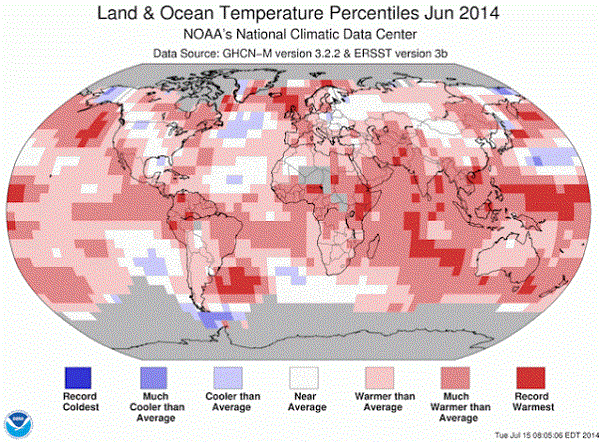
In fact June was the highest departure from average for any month on record.
The last below-average global temperature for any month was February 1985. The last below average June was in 1975 when Gough Whitlam was PM!
The majority of models still favour a spring El Niño:
Warming in the tropical Pacific Ocean since the beginning of 2014 has primed the climate system for an El Niño in 2014, although an atmospheric response is yet to be observed. As a result, the transition towards El Niño conditions has slowed in recent weeks. While five out of eight climate models surveyed by the Bureau suggest El Niño will become established by October, all have eased their strength over the past few months. Three models suggest an El Niño will not occur in 2014, while another indicates only a brief period of El Niño-like conditions.
3. Temperatures poised to rise rapidly
El Niño years are often associated with a higher than average temperature rise. However, there’s another reason temperatures may be about to rise. You may recall that around 93% of the extra global warming goes into the ocean and only 2.3% into the atmosphere:
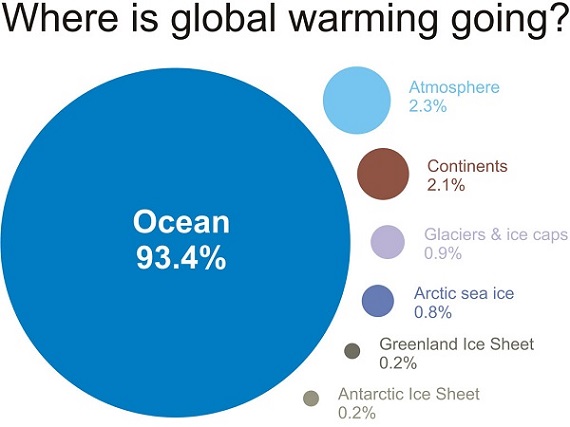
In recent years the trade winds have speeded up causing deep mixing in the ocean, taking warm water deeper displacing cooler water which rises to the surface to be warmed. Sooner or later this will stabilise, with more heat going into the atmosphere.
The article also points out the recent correction of the Hadley Centre temperature record, adding in an estimate for the polar regions, where there are no weather stations. This correction virtually eliminates the famous ‘pause’. The heavy lines show the corrected data:
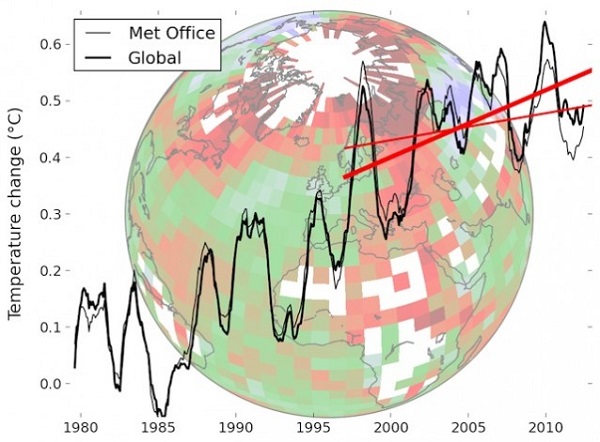
4. Onshore wind is now the cheapest form of new energy in Denmark
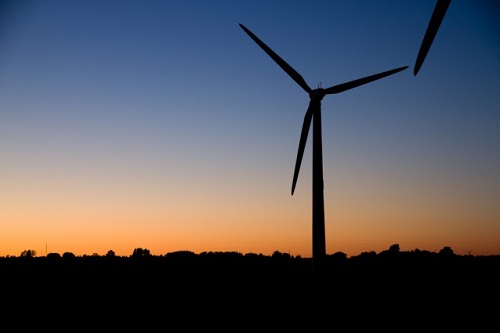
A new analysis from the government of Denmark found that wind power is by far the cheapest new form of electricity in the country. New onshore wind plants coming online in 2016 will provide energy for about half the price of coal and natural gas plants, according to the Danish Energy Agency (DEA), and will cost around five cents per kilowatt hour.
5. Abbott bets the house on coal
Meanwhile our visionary PM bets the house on coal as the world price is collapsing and countries turn to renewables.
The price for thermal coal has plunged more than 10 per cent in the last two months as the presumed major customers – China and India – make it clear that renewable energy is offering a competitive alternative to coal and gas.
The current spot market has been below the cost of production.
China may cease to import coal in a few years. The Europeans are talking about ramping up targets for emission reductions, energy efficiency and renewable energy. The Indians are
building of “mega” capacity solar farms, off-grid solar pumps for irrigators, solar installations over canals, cuts in tariffs for solar components and a doubling of the tax on coal – has been followed by an announcement that the country will look to expand a “rent-a-roof” program from solar installations initially begun in Gujarat, the home state of new PM Narendra Modi, who has promised a “saffron revolution” of solar power.
Tata Power is providing interest free loans up to $4,000 for rooftop solar.
Bloomberg New Energy Finance last week predicted solar would beat coal plants on costs by 2020. Chile has announced a whole series of large scale solar plants. On and on it goes.
Here in Sydney there was concern at the Clean Energy Week conference that Abbott can cripple renewables by doing nothing. According to one speaker
even if the 41,000GWh target was retained, and long term certainty provided, the removal of the carbon price will make it difficult to obtain financing for wind and solar farms from financial institutions.
That’s because the carbon price and the RET were designed to work together. If the carbon price is removed, then there is a massive shortfall in revenue when the certificates issued under the RET expire in 2030…
John D has been calling it but here’s a dramatic graph showing how large scale investment has stopped in its tracks:
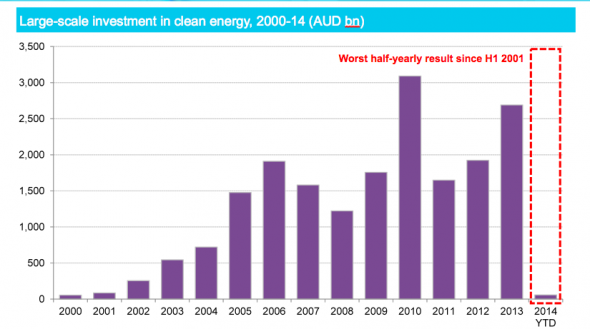
I couldn’t find a decent review of Ian Chubb’s excellent book Power failure, which traces climate policy in Australia from before the 2007 election to the installation of the Abbott government. The link in the heading is to a revealing interview with the author by The Fifth Estate. Chubb:
“[Climate change denial] is a cultural issue for the Coalition. It’s nothing to do with rationality or reason or the future or business – it’s tribal. While this government is in power we can’t recreate the consensus.
“For this government burning coal to make electricity is the equivalent to eating red meat – if you don’t, you’re a sissy. So this government will never have sympathy for making renewable energy – only sissies do that. The government has attempted to shut down everything to do with renewable energy.”
He the goes on to talk about revenge, tribalism and well-flung mud.
He describes the current policy situation as current policy situation as a “ridiculous and expensive mess”. Two things might change it. One is leadership from the US. The other is that nasty things may have to happen from the climate itself.
My sense is that the damage to confidence wrought by this mob is such that a change of government with new policies may not be enough. We need the Tea Party to get real before confidence can be restored.
I need to say more about Chubb’s book which is clear-eyed about the strengths and weaknesses of both Rudd and Gillard. Anyone wondering why some of Rudd’s colleagues thought he had to go should read this extract in The Age.

That’s according to über-meteorologist Jeff Masters posting at Climate Progress.
The year was extraordinary, featuring the hottest year on record equalling 2005, the most extreme winter Arctic atmospheric circulation on record, the warmest and driest winter on record for North America-Canada, the lowest volume of Arctic sea ice on record and 3rd lowest in extent, a record melting in Greenland, the second most extreme shift from El Niño to La Niña, the second worst coral bleaching year, the wettest year over land, the Amazon rainforest experienced its 2nd 100-year drought in 5 years and, it must be said, we had the lowest global tropical cyclone activity on record. Here’s the precipitation graph: Continue reading Climate clippings 33